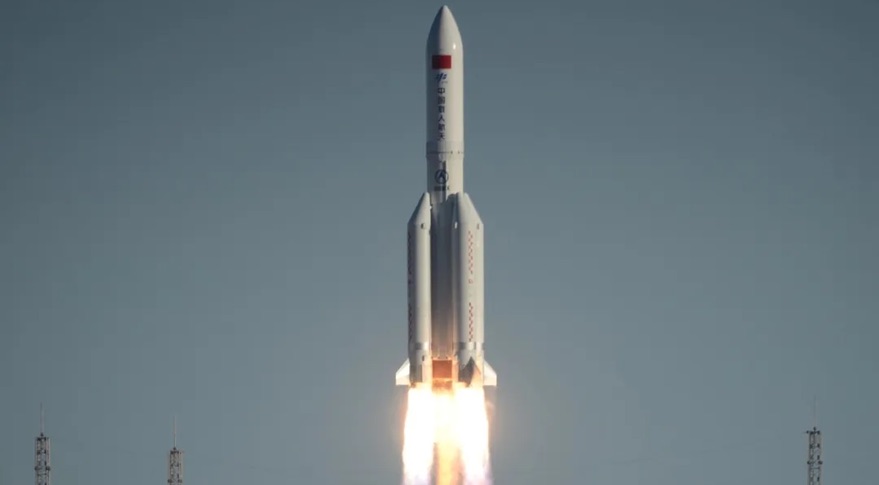WASHINGTON — NASA Administrator Jim Bridenstine criticized China May 15 for the “really dangerous” reentry of a large rocket stage earlier in the week that led to debris landing in Africa.
In brief comments opening the online meeting of the NASA Advisory Council’s Regulatory and Policy Committee, Bridenstine used the May 11 reentry of the Long March 5B core stage as an example of the behavior that was contrary to the norms of behavior for space activities NASA sought to endorse through its Artemis Accords.
The inaugural Long March 5B launch May 5 successfully placed into low Earth orbit a prototype next-generation crew capsule, which landed three days later, as well as an experimental cargo spacecraft that made an unsuccessful reentry a day after launch. However, the rocket’s core stage, 31.7 meters long and 5 meters in diameter, was left in a low, uncontrolled orbit.
That core stage reentered at 11:33 a.m. Eastern May 11 off the coast of west Africa, according to the U.S. Space Force’s 18th Space Control Squadron. However, local reports suggest debris from that 20-ton stage appears to have survived reentry and landed in the African nation of Côte d’Ivoire, along the vehicle’s trajectory but more than 2,000 kilometers downrange from the reentry point. That debris included a pipe or conduit about 12 meters long.
“It was seemingly a successful launch, until we started getting information about a reentry of a rocket body, a reentry that was really dangerous,” Bridenstine said at the committee meeting. “It flew over population centers and it reentered Earth’s atmosphere. It could have been extremely dangerous. We’re really fortunate in the sense that it doesn’t appear to have hurt anybody.”
A slightly earlier reentry could have posed a risk to the United States. The core stage’s trajectory took it over the U.S., from Los Angeles to New York, before going over the Atlantic. A reentry just a half-hour earlier could have resulted in debris landing on U.S. soil.
Chinese officials have not commented on the Long March 5B core stage reentry, including whether the debris found in Côte d’Ivoire is from the rocket. It’s also not clear if the core stage was intentionally placed into a low orbit that led to the uncontrolled reentry of if the vehicle malfunctioned in some way.
Bridenstine linked the Long March 5B reentry to the Artemis Accords, the series of principles for space activities that NASA will ask potential international partners to adhere to if they want to participate in the agency’s Artemis lunar exploration program. One of those principles is maintaining a “safe and sustainable environment in space” by following orbital debris mitigation guidelines as well as the Guidelines for the Long-term Sustainability of Outer Space Activities approved by the United Nations in 2018.
“These guidelines are critically important,” he said, calling the core stage reentry “a perfect example of why the Artemis Accords are important. There needs to be an agreed-upon framework for how we’re going to operate in space safely.”
Bridenstine’s statement about the Long March 5B reentry is not the first time he has criticized another country for actions that jeopardize space safety. Days after India tested a direct-ascent anti-satellite weapon in March 2019, destroying an Indian satellite and creating hundreds of pieces of debris, Bridenstine called the test a “terrible thing” that increased the risks to the International Space Station.
“It’s unacceptable, and NASA needs to be very clear about what its impact to us is,” Bridenstine said in a town hall meeting. That criticism was far stronger than what the State Department and other U.S. government agencies offered immediately after the test.
NASA’s reaction, though, appeared to go too far for the administration. Immediately after the test, NASA informed the Indian Space Research Organisation (ISRO) that it was suspending participation in a working group involved in studying any potential assistance NASA could provide to ISRO’s new human spaceflight program. Several days later, though, Bridenstine sent another letter to ISRO ending that suspension. “Based on guidance received from the White House, I look forward to continuing these groups in the future,” he wrote.
